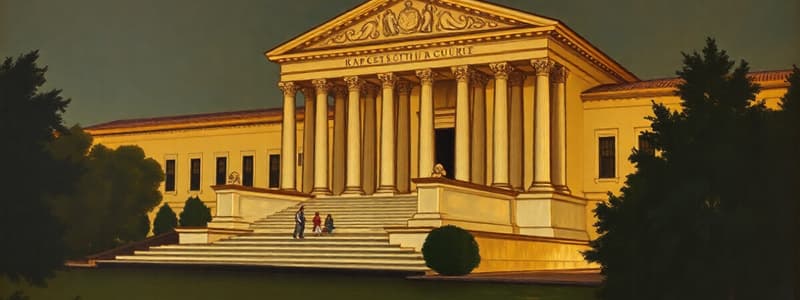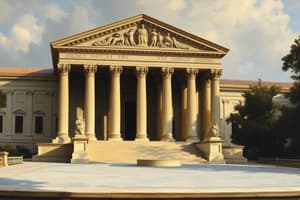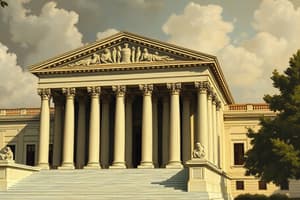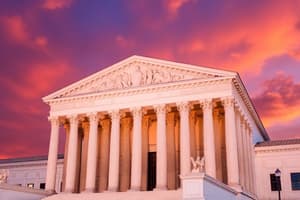Podcast
Questions and Answers
Which scenario most accurately reflects the principle of judicial review as established in Marbury v. Madison?
Which scenario most accurately reflects the principle of judicial review as established in Marbury v. Madison?
- A state court rules a federal law unconstitutional, and the Supreme Court declines to hear the case.
- The President vetoes a bill passed by Congress, and the Supreme Court hears a challenge to the veto power itself.
- Congress passes a law limiting the Supreme Court's appellate jurisdiction, which the Court subsequently overturns. (correct)
- The Senate refuses to confirm a presidential nominee to the Supreme Court, citing concerns about the nominee's judicial philosophy.
What is the most significant implication of the 'good behavior' clause regarding the tenure of federal judges?
What is the most significant implication of the 'good behavior' clause regarding the tenure of federal judges?
- It ensures judges remain responsive to public opinion throughout their tenure.
- It protects judges from potential retribution for unpopular decisions, safeguarding impartiality. (correct)
- It requires judges to periodically demonstrate their legal competence to maintain their position.
- It mandates regular performance evaluations by the Senate Judiciary Committee.
In which scenario would a federal court most likely have original jurisdiction?
In which scenario would a federal court most likely have original jurisdiction?
- A state appeals a decision by a federal agency regarding environmental regulations.
- Two states are in dispute over the control of a river that runs along their border. (correct)
- An individual appeals a conviction for violating a state law prohibiting certain types of protests.
- A citizen of California sues a citizen of Nevada for $50,000 due to a car accident.
What action could Congress take to directly counteract a Supreme Court decision with which it disagrees, without altering the Constitution?
What action could Congress take to directly counteract a Supreme Court decision with which it disagrees, without altering the Constitution?
Why is the burden of proof in a criminal case 'beyond a reasonable doubt' compared to 'preponderance of the evidence' in a civil case?
Why is the burden of proof in a criminal case 'beyond a reasonable doubt' compared to 'preponderance of the evidence' in a civil case?
Which scenario exemplifies a potential challenge to judicial independence?
Which scenario exemplifies a potential challenge to judicial independence?
Suppose a state law conflicts with a treaty ratified by the U.S. Senate. Which principle determines which law takes precedence, and why?
Suppose a state law conflicts with a treaty ratified by the U.S. Senate. Which principle determines which law takes precedence, and why?
What is the role of the Senate Judiciary Committee in the appointment of federal judges, and why is it significant?
What is the role of the Senate Judiciary Committee in the appointment of federal judges, and why is it significant?
How does the power of judicial review, as exercised by the Supreme Court, most directly affect the balance of power among the three branches of the U.S. government?
How does the power of judicial review, as exercised by the Supreme Court, most directly affect the balance of power among the three branches of the U.S. government?
Which scenario represents a court exercising concurrent jurisdiction?
Which scenario represents a court exercising concurrent jurisdiction?
If Congress passes a law that a state believes infringes upon its reserved powers, which judicial avenue would the state most likely pursue to challenge the law's constitutionality?
If Congress passes a law that a state believes infringes upon its reserved powers, which judicial avenue would the state most likely pursue to challenge the law's constitutionality?
A U.S. District Court judge makes a ruling that contradicts established precedent from the circuit court of appeals in their region. What is the likely outcome of this situation?
A U.S. District Court judge makes a ruling that contradicts established precedent from the circuit court of appeals in their region. What is the likely outcome of this situation?
A case originates in a U.S. District Court, is appealed to a Circuit Court of Appeals, and then is appealed to the Supreme Court. Which of the following best describes what the Supreme Court will consider?
A case originates in a U.S. District Court, is appealed to a Circuit Court of Appeals, and then is appealed to the Supreme Court. Which of the following best describes what the Supreme Court will consider?
In what scenario would the Supreme Court be most likely to exercise its original jurisdiction?
In what scenario would the Supreme Court be most likely to exercise its original jurisdiction?
What is the most significant restraint on the Supreme Court's power of judicial review in the United States?
What is the most significant restraint on the Supreme Court's power of judicial review in the United States?
If a justice on the Supreme Court consistently interprets the Constitution based on the original intent of its framers, what judicial philosophy do they most likely adhere to?
If a justice on the Supreme Court consistently interprets the Constitution based on the original intent of its framers, what judicial philosophy do they most likely adhere to?
A case involving a dispute over patent law would most likely be heard in which of the following courts?
A case involving a dispute over patent law would most likely be heard in which of the following courts?
A federal judge is nominated by the President and confirmed by the Senate. Later, evidence emerges suggesting the judge accepted bribes while serving as a state official prior to their federal appointment. What is the most appropriate process for removing the judge from their position?
A federal judge is nominated by the President and confirmed by the Senate. Later, evidence emerges suggesting the judge accepted bribes while serving as a state official prior to their federal appointment. What is the most appropriate process for removing the judge from their position?
What would happen if the Supreme Court were to issue a ruling that is directly contradictory to the clear and explicit wording of the U.S. Constitution?
What would happen if the Supreme Court were to issue a ruling that is directly contradictory to the clear and explicit wording of the U.S. Constitution?
A group of states believes that a recent federal law infringes upon their rights, as guaranteed by the Tenth Amendment. They decide to challenge the law in court. To have legal standing, what must they demonstrate?
A group of states believes that a recent federal law infringes upon their rights, as guaranteed by the Tenth Amendment. They decide to challenge the law in court. To have legal standing, what must they demonstrate?
Flashcards
Judicial Branch
Judicial Branch
Branch of U.S. government that interprets and applies laws.
Supreme Court
Supreme Court
Highest court in the federal judiciary.
Judicial Review
Judicial Review
Power to declare laws unconstitutional.
District Courts
District Courts
Signup and view all the flashcards
Courts of Appeals (Circuit Courts)
Courts of Appeals (Circuit Courts)
Signup and view all the flashcards
Specialized Courts
Specialized Courts
Signup and view all the flashcards
Supreme Court Composition
Supreme Court Composition
Signup and view all the flashcards
Appointment of Justices
Appointment of Justices
Signup and view all the flashcards
Justice Term Length
Justice Term Length
Signup and view all the flashcards
Supreme Court Decisions
Supreme Court Decisions
Signup and view all the flashcards
Appointment of Federal Judges
Appointment of Federal Judges
Signup and view all the flashcards
Judicial Independence
Judicial Independence
Signup and view all the flashcards
Federal Court Jurisdiction
Federal Court Jurisdiction
Signup and view all the flashcards
Civil Cases
Civil Cases
Signup and view all the flashcards
Criminal Cases
Criminal Cases
Signup and view all the flashcards
Discovery (in law)
Discovery (in law)
Signup and view all the flashcards
Burden of Proof
Burden of Proof
Signup and view all the flashcards
Checks on Judicial Branch
Checks on Judicial Branch
Signup and view all the flashcards
Impact of Judicial Branch
Impact of Judicial Branch
Signup and view all the flashcards
Study Notes
- The judicial branch is one of the three branches of the U.S. federal government
- Its role is to interpret and apply the laws of the United States
- It is composed of the Supreme Court and lower federal courts
Supreme Court
- The Supreme Court is the highest court in the federal judiciary
- It consists of a Chief Justice and eight Associate Justices
- Justices are nominated by the President and confirmed by the Senate
- They serve lifetime appointments, "during good behavior," unless they resign, retire, or are removed through impeachment
- The Supreme Court has the power of judicial review, which allows it to declare laws or executive actions unconstitutional
- It has original jurisdiction in certain cases, such as disputes between states, but primarily hears cases on appeal from lower federal courts and state supreme courts
- A majority vote (at least five justices) is required to decide a case
- The Supreme Court decisions are binding on all lower courts
Lower Federal Courts
- The lower federal courts are organized into district courts, circuit courts of appeals, and specialized courts
District Courts
- District courts are the trial courts of the federal system
- There are 94 federal judicial districts in the United States
- Each state has at least one district court, and some states have multiple
- District courts have original jurisdiction over most federal cases, including civil and criminal cases
- A single judge usually presides over a district court case, although some cases may be heard by a three-judge panel
Courts of Appeals (Circuit Courts)
- The courts of appeals are intermediate appellate courts that hear appeals from the district courts within their respective circuits
- There are 13 circuit courts of appeals
- Eleven are defined by geographic region, one for the District of Columbia, and one for the Federal Circuit (nationwide jurisdiction for specialized cases, such as patent law)
- Appeals are typically heard by a panel of three judges
- The courts of appeals review the decisions of the district courts for errors of law
- The decisions of the courts of appeals are binding on the district courts within their circuits
Specialized Courts
- The specialized courts have nationwide jurisdiction over certain types of cases
- Examples include the Court of International Trade, the Court of Federal Claims, and the Tax Court
- These courts handle cases involving specific subject matter expertise
Judicial Review
- Judicial review is the power of the courts to declare laws or executive actions unconstitutional
- It was established in the landmark case of Marbury v. Madison (1803)
- It is a fundamental check on the power of the legislative and executive branches
- The Supreme Court is the final arbiter of the Constitution
Appointment of Judges
- Federal judges, including Supreme Court justices, are nominated by the President and confirmed by the Senate
- The Senate Judiciary Committee plays a significant role in the confirmation process, holding hearings and making recommendations to the full Senate
- A majority vote in the Senate is required for confirmation
- The appointment process can be highly political, particularly for Supreme Court nominations
Judicial Independence
- Judicial independence is a cornerstone of the American judicial system
- Judges are appointed for life (or "during good behavior") to protect them from political pressure
- Their salaries cannot be reduced during their tenure
- These protections are intended to ensure that judges can make impartial decisions based on the law, without fear of reprisal
Federal Court Jurisdiction
- Federal courts have limited jurisdiction, meaning they can only hear certain types of cases
- They have jurisdiction over cases involving federal law, the U.S. Constitution, treaties, and disputes between states or citizens of different states
- State courts have jurisdiction over all other cases
- Concurrent jurisdiction exists when both federal and state courts have the authority to hear a case
Court Procedures
- Court procedures vary depending on the type of case and the court
- Civil cases involve disputes between private parties, while criminal cases involve violations of the law
- Cases typically begin with the filing of a complaint or indictment
- The parties engage in discovery, which involves gathering evidence and information
- Cases may be resolved through settlement, trial, or other means
- Appeals can be taken to higher courts
- The burden of proof in a criminal case is "beyond a reasonable doubt," while the burden of proof in a civil case is "preponderance of the evidence."
Checks and Balances
- The judicial branch is subject to checks and balances from the other two branches of government
- The President nominates judges, and the Senate confirms them
- Congress can impeach and remove judges from office
- Congress can also amend the Constitution, which can effectively overturn Supreme Court decisions
- The judicial branch can declare laws passed by Congress or actions taken by the President unconstitutional
Impact on Society
- The judicial branch plays a significant role in shaping American society
- Court decisions can have a profound impact on individual rights, government policies, and business practices
- Landmark cases, such as Brown v. Board of Education (1954) and Roe v. Wade (1973), have had a transformative impact on American life
- The judicial branch is responsible for ensuring that the laws are applied fairly and consistently
Studying That Suits You
Use AI to generate personalized quizzes and flashcards to suit your learning preferences.
Description
Explanation about the judicial branch, one of the three branches of the U.S. federal government, which interprets and applies the laws of the United States. It is composed of the Supreme Court and lower federal courts. The Supreme Court is the highest court in the federal judiciary.




